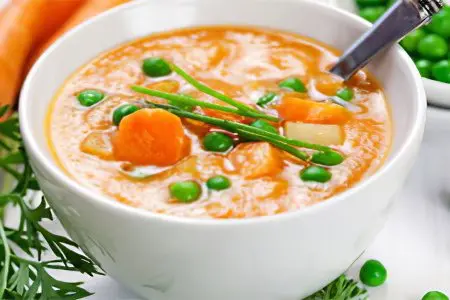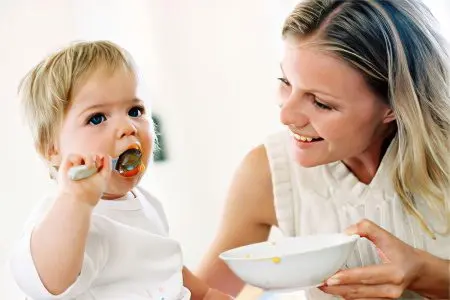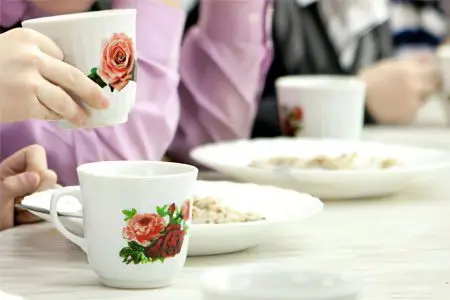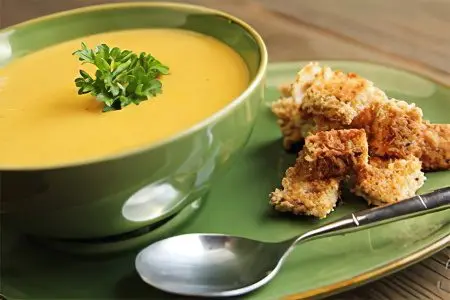Contents
- How to treat intestinal infections with a diet?
- What diet is indicated for intestinal infections in adults?
- Diet rules
- Diet for intestinal infections in a child
- What can you eat during intestinal infections?
- What can not be eaten during intestinal infections?
- Features of compiling a menu for intestinal infections

A diet for an intestinal infection is a prerequisite that must be observed for the speedy recovery of the body. Dietary nutrition in case of intestinal damage by pathogenic flora is an obligatory item in the treatment of the disease. With intestinal infections, the entire digestive system as a whole suffers. During diarrhea and vomiting, not only water is removed from the body, but useful substances that it needs to maintain normal life.
These substances need to be replenished, but in such a way that the digestive organs are able to cope with the incoming volumes of food. In fact, a diet for intestinal infection is the most important part of symptomatic therapy that cannot be ignored.
How to treat intestinal infections with a diet?

Regardless of which pathogenic microorganism provoked the development of the disease, therapy should begin with a complete rejection of food. This means that during the acute stage of the disease, an adult can only drink water or rehydration solutions.
If the disease is not too severe, then it is permissible to drink sweet black tea – no more than 1,2 liters per day. At the same time, a person should drink about 2,5 liters of water per day or even more. It is possible to use rice broth passed through a sieve, infusion of wild rose or blueberries. All these drinks, in addition to replenishing the excreted volumes of liquid, are sources of vitamins and nutrients that the body needs so much. Blueberries and rice water have the ability to bind harmful substances and remove them from the body, which allows you to quickly cope with the infection.
On the first day of illness, you can drink drinks that reduce vomiting. It can be mint decoction or homemade lemonade. To do this, knead a lemon in a glass, pour it with hot boiled water and insist for a quarter of an hour. Add a teaspoon of honey to the drink. Such a drink is offered to the patient every 20 minutes, 2 tablespoons. When the acute phase of the disease is completed, you can proceed to the use of products, but taking into account certain features of their selection and preparation.
What diet is indicated for intestinal infections in adults?
If a person enters a hospital, then there he is prescribed a dietary table number 4. This is a therapeutic nutrition system, which is built in such a way that it does not burden the digestive system, but saturates the body with nutrients.
The goals of table number 4 are:
Sparing of the organs of the gastrointestinal tract. Moreover, sparing will be both chemical and mechanical.
Reducing the degree of the inflammatory response of the body.
Reducing fermentation and putrefactive processes in the intestines.
Restoring the efficiency of the intestine, regeneration of its mucous membrane.
The menu is complete and balanced. It has a sufficient amount of protein, and carbohydrates and fats are slightly reduced. During intestinal infections, it is necessary to somewhat limit the use of table salt.
All products are offered to the patient in a semi-liquid or liquid consistency. Dishes should be neither hot nor cold. Acceptable methods of processing dishes are boiling and steaming. Before serving, be sure to grind coarse food or grind it in another way. A person eats 5-6 times a day.
The average daily calorie content is equal to 1980 kcal. Salt per day should not be consumed more than 10 g. After the patient feels better, he is transferred to diet No. 4B, which involves a daily increase in the energy value of meals up to 3000 kcal. At the same time, dishes can already be cooked in the oven and stewed. However, product bans remain similar.
Diet rules
In order for the patient to recover quickly, the following dietary rules must be observed:
Dishes should be easily digestible, they should not irritate the mucous membrane of the intestines and stomach, and also load the pancreas.
Meals can be boiled or steamed
Before serving, the products are ground or mashed.
The optimum temperature for food is 33-36 °C.
The optimal portion is 150-300 g, depending on the age and weight of the patient, as well as on the state of his health.
Diet for intestinal infections in a child

The general principles of nutrition for a child during intestinal infections are similar to the principles by which an adult patient eats. However, be sure to take into account the age of the baby.
For the duration of illness, children are no longer given dairy products, although at normal times they must be present on the menu. The fact is that milk contains milk sugar – lactose. Its splitting and digestion occurs in the small intestine, the work of which is disrupted. With a bacterial infection, milk sugar will begin to ferment in the intestines, which will provoke increased gas formation, bloating and pain attacks.
If a child of the first year is exposed to an intestinal infection and at the same time he is bottle-fed, the usual milk mixture must be replaced with a lactose-free mixture.
If a woman is breastfeeding, then you can limit it a little in milk, but not more than 40%. It contains antibodies that help the body of the crumbs to cope with the disease. At the same time, you need to breastfeed your baby more often, but in small portions. You should not force the baby to suck on the breast, you need to focus on his appetite.
If the child has already reached the age when milk or milk formula is not the basis of his diet, then he should follow the same diet as an adult patient with an intestinal infection.
Indicative menu for a child with an intestinal infection:
Semolina or semi-liquid rice porridge on the water. Rice groats should be wiped. A glass of sweet tea and a wheat flour toast.
In the interval between breakfast and lunch, the patient is offered a glass of jelly and a cracker.
For lunch, the child can eat beef broth, crackers and meat soufflé. Supplement lunch with a glass of rosehip broth.
Blackcurrant jelly is eaten during an afternoon snack.
Dinner can be represented by grated oatmeal and steamed chicken cutlet. Before going to bed, it is good to drink a glass of apple compote.
What can you eat during intestinal infections?

The menu should include the following products and dishes:
Bread made from wheat flour, but not fresh, but yesterday, slightly dried. Dry biscuits, inedible pastries.
Soups in weak fish or meat broth. Vegetables should be finely chopped, meat frayed. You can cook soup with meatballs, croutons or vermicelli.
Meat is served in the form of soufflé, cutlets, meatballs, minced meat rolls. It can be low-fat varieties of red meat, rabbit meat, chicken, turkey. You can cook meat pate.
The porridge should be viscous. They are boiled in water, without the addition of milk.
The menu may include soft-boiled eggs, steam omelet, vermicelli.
Boiled buckwheat and rice, boiled potatoes, pumpkin, carrots are used as a side dish. You can cook mashed potatoes, stews or caviar from vegetables.
You can eat cottage cheese puddings, fresh cottage cheese, cottage cheese paste.
Twice a day, kefir is allowed to be consumed in 100 ml.
You can add a small amount of butter to dishes or bread
Kissels, decoctions of dried fruits, rosehip decoction are allowed.
You can drink tea with marmalade, honey or jam.
If the body does not give a negative reaction, then it is allowed to enter fresh tomatoes in the patient’s menu (it is important that they are ripe), cauliflower, carrots, baked apples, raspberries, blueberries, strawberries. In soups, you can put a little sour cream. In this case, it is necessary to carefully monitor the patient’s well-being and, if it worsens, return to the original dietary menu.
What can not be eaten during intestinal infections?
The following foods and dishes should be excluded from the menu:
Black bread and fresh bread made from wheat flour.
All raw vegetables and fruits, as they are sources of coarse dietary fiber. Digest his intestines will not be able to.
Mushrooms and fresh herbs.
Barley, millet and corn grits.
Salt restriction – up to 10 g per day.
Vegetable oil.
Carbonated drinks.
Meat, vegetable and fish broths of high concentration.
Sausage, smoked products, animal fats.
Fatty red meat, fatty poultry (duck, goose). Chicken eggs should not be eaten fried or boiled.
Preserved products.
Whole milk, spicy cheese.
Cream, pastry cream, sour cream.
Legumes in any form, white cabbage.
Dumplings and dumplings.
Sauces
Strong coffee, carbonated drinks, chocolate, spirits.
Ice cream.

Since the list of allowed products is quite impressive, you can cook tasty and varied. Be sure to take into account the acceptable methods of culinary and thermal processing of products.
It is recommended to alternate protein meals, since almost all patients with intestinal infections have reduced appetite.
The diet provides sparing of the mucous membrane of the digestive organs, does not provoke fermentation processes in the intestines. His peristalsis will be adequate, but not excessive. Products on the menu must be fresh. They are designed to have a detoxifying and rehydrating effect.
It should be noted that the presented dietary menu is not suitable for eating healthy people, as it cannot provide the human body with the nutrients it needs in full. The diet is prescribed for a short period of time. As he recovers, the patient is transferred to the common table.
During the recovery period, pectin-containing vegetables and fruits are necessarily introduced into the menu. It should be apples, carrots, blueberries. Before serving, bring them to a puree state. Pectin enters the intestines, absorbs moisture and mucus, swells and forms a foamy substance that resembles a sponge. Passing through the intestines, pectin fibers absorb (adsorb) toxins, pathogenic bacteria, undigested food residues. In addition, the fruit contains organic acids that have a bactericidal effect. Do not forget that fruits and vegetables are sources of vitamins and minerals. At the stage of recovery from the disease, they are essential for the body.
During an intestinal infection, it is important not only to take the medications prescribed by the doctor, but also to adhere to a properly composed menu. It is important to focus on the phase of the disease, as well as on the appetite of the patient himself. It will be much easier for the body to get rid of an intestinal infection if a person helps him in this and does not load the digestive organs with heavy food.









